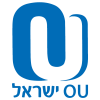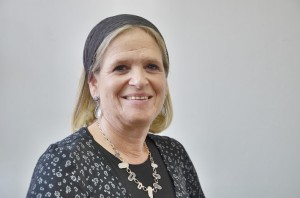Debbie Gross, Director of the Crisis Center for Religious Women in Jerusalem, conducted Post Trauma Intervention Workshops last summer during Operation Protective Edge. The workshops were sponsored by OU Israel.
The Crisis Center has a variety of ongoing activities. They are now preparing for an international conference in Jerusalem, The Jewish Community Confronts Violence and Abuse, December 1-3.
Last summer, Gross and her staff organized workshops for children and adults who were under fire from rockets being shot from Gaza. The workshops were sponsored by OU Israel.
A developmental psychologist, she started the Crisis Center for Religious women in 1993, “because there was no center like this for the religious public,” she says. “It was originally designed to deal with abuse but we also deal with other kinds of stress.”
After the Second War in Lebanon (2006), she perceived the need to help residents of Israel’s north. She trained staff and started post trauma workshops. “Generally in Israel there isn’t enough activity that is quick enough to prevent people from going into trauma,” she says.
As a result, she joined with OU Israel to build a joint program for victims of the War in Lebanon. “Once the war was over we started working two days a week in Sderot [less than 10 kms from Gaza] because we perceived a need.” The residents of Sderot have been targeted by rockets fired from Gaza since 2001.
“The goal of our workshops is to help kids build inner safety,” she says. “During the Second War in Lebanon, no one thought Haifa or Tsefat would be targeted. And it was the same last summer. No one thought this war would go on for weeks. The kids started thinking that maybe they would never be safe,” she says, “and that leads to trauma.”
Debbie Gross recently took time to discuss her work.
How do the workshops in the south during Operation Protective Edge compare to workshops you’ve conducted elsewhere?
What was different this summer is that there was no school. During the second Lebanon war the schools welcomed us with open arms. Kids came with their friends. But this summer, schools were closed. There are also different backgrounds and panic levels in the towns that were shelled this summer. For example, in Sderot all the schools have safe rooms. Most of the other locations just don’t have the space.
We didn’t have any discipline issues this year. In Netivot, for example, we had 15-16 year old boys in the same workshop as little kids. Why? Because siblings didn’t want to be alone.
Another difference is that Operation Pillar of Defense in 2012 was very short. This summer the war went on for seven weeks.
How different are the towns you worked in this summer?
The kids in Sderot grew up with this. But kids in other towns never really thought about being threatened by rockets. It never entered their minds.
We wanted to do more for parents but they were afraid to leave their kids. Some of the parents were hysterical or simply not functioning.
One of the best workshops I ever conducted was in a factory. I walked into a room of more than 40 men. For most of them this was the first time they could talk about not being able to protect their families.
Unfortunately, one of Israel’s mistakes is treating people after the fact. What makes the OU Israel program unique is that it tries to prevent trauma from setting in.
How many of the kids you worked with need psychological intervention? Are there specific factors that influence this?
Every child needs a workshop. Some will need more work later.
For example, a child growing up in a supportive, functioning family is different from a child who doesn’t have that. The ones from non-functioning families have much more trouble. Another factor is whether the home has a safe room. It’s very different when kids have a few seconds to run down the street to get into a shelter.
Children who have strong egos can process what’s happening and move on. If they don’t have a strong ego, the result is much worse.
How the parents process this affects their children. The Gulf War [in the winter of 1990-1991] was Israel at its best. They told us what to do. Slowly and in stages. People were much calmer.
How do you treat children who have been traumatized by war?
Our workshops get them in touch with their feelings of collective victimization. ‘This didn’t just happen to me.’ A lot of them will be fine. Our workshops will help them be even better.
How do you design your workshops?
The main activity we do with the kids is building a variety of tools they can use. They put them in a tool box that represents different age-appropriate activities.
We get them to think about what makes them feel safe. They get a sheet of paper to put in their tool box that reminds them of things that make them feel good: davening, ice cream, pizza, a hug from Ima. They put all these things in their tool boxes and then we teach them how to think about them and use them.
We like to do guided imagery but this summer instead of closing their eyes and dreaming, we encouraged them to scream. It worked.
We also talk about different things they can do to calm down. We explain that it’s really important to talk. Not to keep their thoughts in.
What motivates you?
The only way to deal with evil is to try to put something good in its place. We have to face the fact that we’re fighting evil. One of the goals of our workshops is to do something that no one else is doing.
What are the kids telling you in the workshops? Do you hear similar reactions from kids in different locations?
What we hear repeatedly is that there are soldiers fighting to protect the country. The kids believe that the soldiers are going to stop the rockets. That’s one part. The other part is their fear. Many of the children have brothers and fathers serving in the IDF. In addition they fear that their houses will be bombed and they will be killed.
What kinds of things will you remember about this summer?
A little girl in one of the workshops drew a very clear picture of a rocket aimed at an apartment building. I asked if she wanted to show it to her mother. “No,” she told me, “because my Ima cries all the time and I don’t want her to be more upset.”
Over and over kids in the workshops tell me they don’t want to scare their mothers.
These important workshops are ongoing. To support this project click here and designate OU Israel Center.

